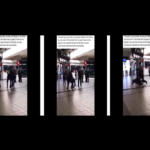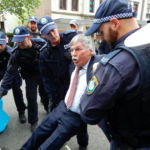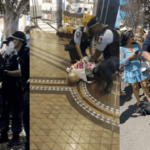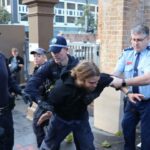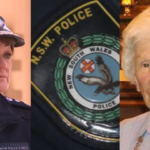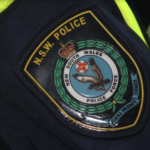“Under Threat of Police Brutality”: An Interview with the Port Melbourne ZIM Ship Community Picket
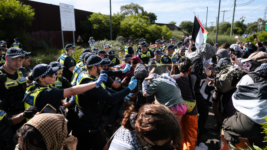
The Port Melbourne ZIM Ship Community Picket served to successfully prevent a ship belonging to Israeli company ZIM from docking at the Port Melbourne Webb Dock, so it couldn’t pull in and deliver its goods.
Not only did this cause the 1948-established shipping company delays, but it also cost it millions.
Numerous local pro-Palestinian groups partook in the four-day long picket, which included Free Palestine Melbourne, Block the Dock, the Black People’s Union (BPU), Whistleblowers, Activists and Communities Alliance (WACA), the Renters and Housing Union (RAHU) and Sit Intifada.
The community picket against Israeli’s oldest shipping company is due to the four-month-long wholesale massacre being perpetuated upon the 2.3 million Palestinians in the walled-in region of Gaza.
The death toll has now surpassed 26,000, which includes 10,000 children murdered.
The International Court of Justice ruled on 26 January that as South Africa’s case charging Israel with genocide is plausible, the Zionist state must cease actions that appear at face value to be genocidal. However, Israeli prime minister Benyamin Netanyahu has dismissed the court’s findings.
Supporting activists
Melbourne Activist Legal Support (MALS) had six legal observers on the ground over the course of the blockade. And in a 25 January statement of concern, it notes seven key policing issues, and calls for these to be further inquired into.
The policing issues involve the removal of a person from a wheelchair, mistreatment of medics and first aiders, unlawful use of pepper spray, dangerous and excessive area-denial manoeuvres, surveillance and monitoring, mistreatment of legal observers and use of handcuffs.
MALS made several recommendations in regard to the recent action and future demonstrations. These include police following protocol, that the Victorian corruption commission inquiry into whether rights were breached and that the law enforcement body review its picket line policies.
“Independent monitoring of the policing of protests is essential for defending the right to organise and participate in public assemblies,” the MALS statement makes clear. “The practice of independent scrutiny of police is recognised by” the United Nations Human Rights Committee.
Sydney Criminal Lawyers spoke to representatives from several of the pro-Palestinian groups that assisted in the long delaying of the ZIM ship, which is part of a broader campaign by unions across the nation to hinder shipments being made by this key Israeli company.
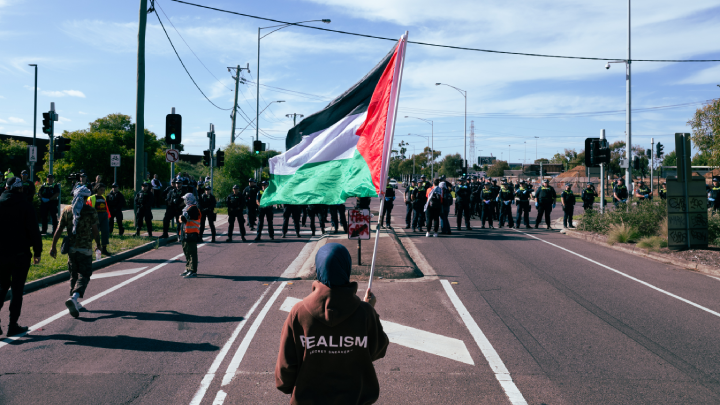
A couple of hundred Victoria police officers descended upon the four day-three night ZIM Ship Community Picket of Port Melbourne Webb Dock, which successfully prevented a ship owned by Israeli company ZIM from unloading the goods it had transported to Melbourne until the picket was broken.
A number of different groups were involved in the blockade, including Free Palestine Melbourne, Block the Dock, the Black People’s Union (BPU), Whistleblowers, Activists and Communities Alliance (WACA), the Renters and Housing Union (RAHU) and Sit Intifada.
News reports state that ten demonstrators were arrested, nine on trespass. And those same reports show a group of police officers who appear to be attacking a bunch of unarmed civilians.
Can you talk about the police use of force on activists last Monday? And how was the law enforcement approach taken over the course of the ZIM Port Melbourne blockade?
Black People’s Union: At approximately 4 pm, the three picketed gates were steadily surrounded by five police on horses, four to seven armoured trucks full of PORT cops, a Toyota Coaster bus and two coach buses completely full of cops.
At this time, organisers and community members secured four to six people, as well as pieces of temporary fencing, to the picketed gates using bicycle locks and chains.
Community members at Gate A cleared the intersection of belongings and prepared to confront police.
At this time, a kettle blockade was set up by police, blocking all access and entry to the Webb Dock Gate A area. There was no safe place for anyone to stay who did not want to confront police.
Activists at Gate A numbered approximately 50 to 60. Present were regular Victoria police officers, high level commanders in white shirts and PORT cops.
Police numbered from 100 to 200 at Gate A. Activists prepared to protect the picket, spreading out across the intersection, remaining mobile, covering their eyes and faces from imminent pepper spray attacks, with medics preparing to treat activists onsite.
Activists wrote lawyers’ numbers on their arms and were given arrestable cards with information and a booklet on arrest information by prepared militant activists. Many people were very new to activism and had never confronted police.
Gate A had an experienced police negotiator, who spoke to Victoria police commanders on behalf of the picket.
Spirits were continually high, with activists chanting for Free Palestine, Intifada and revolution. Activists also climbed the walls of the enclosed area to wave Palestinian flags.
The mood was tense, with several hundred police clearly ready to infiltrate the picket, destroy it and break the will of the activists and the community.
There was some will to confront police, especially by anarchists. There were still two activists locked to the gates at Gate A by their necks.
At this time, I made a call as a key organiser filling a leadership role, that I was not willing to ask the community to defend the picket in the face of possibly extreme police violence.
It was clear that we were outnumbered and out organised, and it was clear that we were going to lose the picket at that time.
That being the case, I was not willing to lose a significant number of activists to legal disciplines, fines, injuries etc, to make a point, when it was clear that we had achieved an enormous amount already and when it was clear that we would lose the picket there and then.
This conclusion was based on an in-the-moment analysis of our material power and organisational capacity in relation to that of Victoria police.
The police were clearly heavily enforced and prepared to enforce even more if necessary.
We had elderly, young and disabled comrades, and many who had expressed clear reluctance to confront police directly, though those comrades had certainly stepped up to confront police and defend the picket once we realised that Victoria police had left no space safe for anyone.
At this time, I spoke to other organisers – including Palestinians, police liaison, and more militant activists. I expressed the above concerns.
I was told that they consented to me making that call to the group. I then made it clear to the group that I was not willing to ask community members to put their bodies between the state and the flow of capital.
I made the case to the community picket that we had recorded a huge win and dealt a significant blow to ZIM, and that it would be noble and wise to retreat under threat of police brutality and prepare for more organised action soon.
I made it clear that I was not asking more militant activists to retreat, but that those who wanted to retreat should be able to do so. A clear majority of the group expressed assent to this proposal.
I then asked the police liaison to request that I be able to speak to Victoria police commanders and make this intention clear to them, but Victoria police declined.
They demanded to speak only to the police liaison alone behind their lines. During this conversation, there was some debate amongst activists about whether the police could be trusted.
I also called upon activists on the other side of the compound to exercise restraint and discipline and not to provoke or antagonise police as individuals, as I believed they could trigger organised police violence that the majority of people had opted to avoid.
After this conversation between the liaison and police commanders, and after the police agreed to the proposal, we were given 30 minutes to pack up our whole picket and vacate.
At this time, more militant activists from within anarchist factions prepared to stay on and defend the picket. Their numbers were very small.
Police lines soon began moving in, drawing closer to our group and putting pressure on us to leave through a small walkway leading into a suburban area to the east of the Gate A compound.
Picket members packed up while our police liaison negotiated for appropriate time and a reduction in pressure.
Picket members continued to chant for Free Palestine and for revolution, and some individuals continued to antagonise police, though in a less direct way.
At this time, an anarchist approached me to inform me that the militant anarchist factions would also retreat, as their numbers were far too small and Victoria police numbers too great.
Over about 20 to 30 minutes, we packed up and were pushed out of the small walkway, taking our significant collection of belongings with us.
We arrived out into the suburban area to find, perhaps, 100 people had arrived for the rally we’d called for 5 pm.
At this time, police out on the street formed a blockade between community members and the dock walkway, and began to push and shove community members out into the suburban intersection, across municipal gardens and over bollards and gates.
Community resisted this, standing their ground on the public road, chanting and generally remaining steadfast. Activists led chants and many individuals verbally confronted and argued with police.
Free Palestine Melbourne: I participated as an organiser at the picket on all four days and witnessed various police responses to the picket as the worker shifts passed.
On the first night, police arrived after hours of the picket having been established, with a system where specific workers were stopped from entering the port’s terminal to disrupt the operations of ZIM shipping.
Trucks were let in and workers for other companies and terminals were let in, to the awareness of police.
I became the police liaison for the second picket shift, overnight. Victoria police positioned themselves behind the picket blocking Gate A and then began controlling the entry of trucks, while we continued to block worker’s cars as planned.
Victoria police then shut Gate A and blocked the entry of trucks, even though our picket did not disrupt their business, as we were focussed on a strategy that allows us longer presence at the picket.
As the sun rose, PORT (the Victoria police Public Order Response Team) arrived, and I was told that we would be given a move on order. There were only a few minutes between being told this information and handed the move on order.
Activists had the autonomy to decide whether to comply or move, with many holding the picket through tactics that allow them to move between police lines.
One person was arrested, and a few people were pepper sprayed and injured by police violence.
People who left the port walked back in through another road and reassembled the picket with activists who remained, and the police force retreated.
This was Saturday morning where a pre-organised Palestine motorcade by Renegade Activists was redirected towards a route that ended at the community picket.
This lifted the spirits of the community who had just faced an attempt to break their disruption of ZIM shipping in resistance with Palestine.
And this was just day one and night one. It’s incredible that the picket withstood several rounds of this at the time of worker’s shift changes.
Block the Dock: The response from Victoria police during the recent blockade was frightening.
Videos circulating on social media depict a disproportionate use of force against peaceful demonstrators.
The police, numbering in the hundreds, resorted to aggressive tactics, including the use of pepper spray, physical force and numerous arrests.
The demonstrators, who were primarily engaging in a nonviolent protest to prevent an Israeli ZIM ship from unloading, were met with unnecessary aggression.
The police approach throughout the blockade demonstrated a lack of restraint and a failure to uphold the right to peaceful protest.
RAHU: The action involved community pickets across three gates that lead into the docks.
On day 4, at Gate C, there were approximately 12 people. At around 4:30-5 pm on Monday, the police lined up across the main road in either direction from this gate.
And around 25 to 30 cops in green, with more in blue behind them, were intimidating young members of the community picket.
Two officers came over to say something, but they could barely be heard over the chants of “Free, free Palestine.”
Around fifteen minutes later, the lines of police started to move in. All but six of the pickets moved to the other side of the road.
Of the six left, three had chained themselves to the fence, and the others were worried to leave them to the cops who had shown a lot of violent tendencies over the last four days.
An officer came over and said, “This is your final warning.” And before we could finish the words, “these people can’t leave, they are chained on”, a swarm of police with red marks on their vests came out and grabbed the three who were standing, forcibly holding them by the head, leaving at least one community member with bruises.
I was taken to the police station, where I was questioned in the car before being able to get legal advice. I sat motionless for twenty minutes in the car at the station, with tight cuffs causing pain and then sat in a cell for two hours.
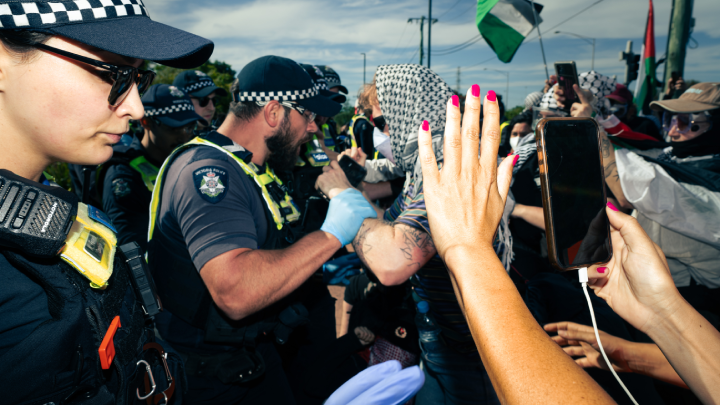
Amongst footage on social media capturing the recent ZIM blockade, demonstrators expressed how successful it had been.
So, what did the blockade achieve? Why was it important to blockade ZIM?
Free Palestine Melbourne: We were able to shift people’s consciousness within the movement towards economic impact as a form of anti-Zionism that we can practise here, from within this colony.
This appealed to many within the movement who have been rallying weekly only to be ignored by the political and media class.
Blockades work, which is no longer a theoretical statement.
Block the Dock: The blockade was a powerful and successful demonstration of solidarity with the people of Palestine.
By preventing the ZIM ship from unloading, we disrupted a key link in the supply chain that supports Israel’s actions.
This nonviolent direct action sent a clear message that Australians stand against complicity in the ongoing atrocities in Gaza.
Locally, it garnered significant attention, raising awareness about the involvement of Australian ports in facilitating the shipment of goods connected to the Israeli regime.
Globally, such actions contribute to a growing movement, urging companies and governments to divest from entities supporting human rights violations.
RAHU: The blockade was hugely successful in slowing down the flow of commerce that supported the genocidal actions of the Zionist state of Israel through ZIM ships.
That amounted to millions of dollars and days of setbacks, if not longer. This was all achieved through nonviolent community action and the support of many organisations and unions.
The impacts are yet to be seen in full but are both a teaching moment for other communities looking to make positive change, and a message of solidarity with our Palestinian comrades.
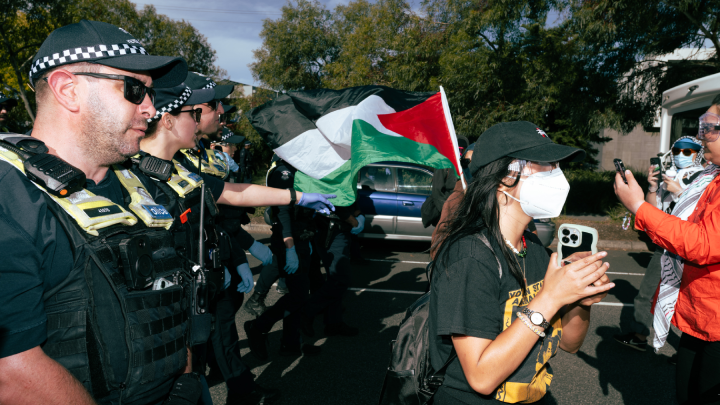
The catastrophe in Gaza has sparked these demonstrations. It continues after more than three months now. Can you explain the motivations for these demonstrations? How would you describe the situation in Gaza at present?
Free Palestine Melbourne: Rank and File unionists are understanding there is great possibility in mobilising within the union movement for an end to the genocide.
It’s powerful to hear unionists draw on radical histories and apply them to the current moment.
It’s terrifying for the Labor government given its own supposed base is not only disappointed but actively opposed to its cruel support for Israel’s genocidal war on Gaza.
Block the Dock: The demonstrations are a direct response to the humanitarian crisis in Gaza, which has persisted for over three months.
The ongoing violence, displacement and loss of innocent lives demand international attention and action.
Australians are motivated to protest against their government’s implicit support for the Israeli government through economic ties.
The situation in Gaza is dire, with thousands losing their lives, and the blockade aims to shed light on the urgency of addressing this crisis.
RAHU: The Renters and Housing Union stand against the forced evictions of individuals and communities from their homes.
We believe in the power of united action. So, we stand with the Palestinian people who are having their homes – and lives – violently taken.
More broadly the community has shown that they see the bloodshed of innocent people and they do not want it to be in their name.
They do not want to have a government who is complicit in this genocide, and they understand that much of the excuses regarding civilian casualties ring hollow.
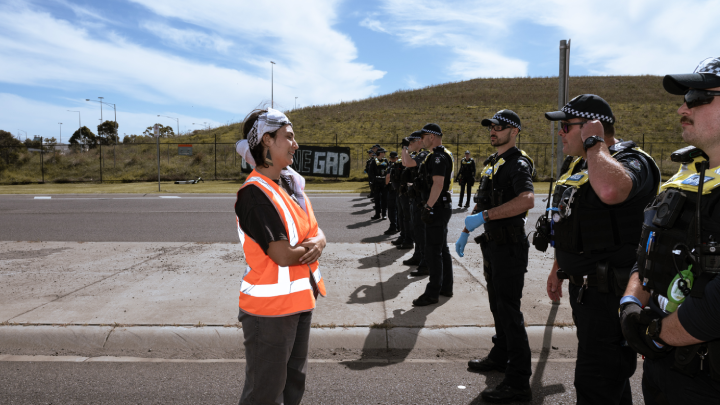
The demonstrations taking place at docks around the continent take more extravagant and perhaps daredevil tactics than their on-the-street city centre counterparts.
I’ve seen recent footage of activists kayaking out to ships and painting graffiti on the side of the vessels, which at the same time looks impressive and somewhat daunting.
What sort of sacrifices would you say it takes to demonstrate on the level that you are? And why take it that step further?
Free Palestine Melbourne: Pro-Palestine activists in Narrm are brave. They are also determined to see an end to the genocide by any means necessary, and they declare this loudly. Yet, the powerful believe the movement can be put to silence.
The ZIM Ship Community Picket shows the determination of the movement to apply impact to Zionist interests and confront the state’s repression.
On day four, when police arrived with over 200 officers, horses, a helicopter, detectives and out-of-uniform police, I was sitting under a gazebo with my two boys who were playing with another Muslim woman’s children at the dock.
I escorted all the children in my car to an area at the beach that I designated as the safe area, where they were looked after by two young women who had another child with them.
I then provided remote communication to the 30 or so people, who were besieged by the police operation and ensured, via spreading text messages, that the wider picket community arrived for a rally we had called at the picket at 5 pm.
We gathered at a meeting point and stood outside the port to meet our friends and comrades who were inside facing the police operation.
So, yes, the tactics are extravagant. But they also involve practices of nurture and care that we do to sustain the struggle and each other.
Block the Dock: Demonstrating against a grave injustice often requires bold and creative actions to draw attention to the cause.
While these tactics may seem extravagant, they are born out of a necessity to break through the apathy and normalise discourse around the Palestinian struggle.
Activists recognise the sacrifices involved, including potential legal consequences, but the urgency of the situation in Gaza compels individuals to push boundaries and demand change through impactful actions.
RAHU: The sacrifices are time, energy, and money – and for some, their bodily health.
But it has become clear that the governments of the day do not respond to the street actions they can ignore – their only concern seems to be their own power and the continued flow of capital, no matter the consequences.
I believe that when all other options are exhausted, good people will always find ways to raise the bar of what can be done when it is the right thing to do.
The Albanese government for a long portion of the wholesale massacre in Gaza supported it outright as an expression of Israeli self-defence. It then issued weak pronouncements about moves towards a ceasefire.
At present, the government has remained on the fence re the South African government’s genocide case against Israel in the International Court of Justice, however it has just announced it is reviewing the stage three tax cuts, with cuts for all.
How do you consider the form of the federal government in regard to the Gaza genocide? And do you think there will be ongoing fallout from it?
Free Palestine Melbourne: The ripple effects of the Labor government’s decision to ignore this mass anti-genocide, antiwar movement will be felt across Australian society.
Antiunion laws will be defied and challenged. The Greens and socialist MPs are already gaining much more support due to their demands to end the occupation of Palestine and end the siege of Gaza.
Palestine is an Australian political issue, and it is undoing not only Zionism but settler colonialism and white supremacy’s ideological foundations within this colony.
Block the Dock: The federal government’s response to the Gaza genocide has been inconsistent and, at times, deeply troubling.
The initial outright support, followed by tepid statements and a lack of clear condemnation, raises concerns about Australia’s stance on human rights violations.
The government’s ambivalence towards the International Court of Justice case further underscores the need for a more principled and ethical foreign policy.
Ongoing fallout may include increased public dissatisfaction and a call for a more ethical approach to international relations.
RAHU: The government, like with the environment, welfare, Indigenous justice, housing and now, the Gaza genocide, has been consistently mealy-mouthed and shown very little appetite for progressive action.
The stage three tax cuts should never have been on the table, we have people who are homeless, food insecure, and below the poverty line.
If the Australian public deserves better, then Palestine deserves better.
And lastly, the successful four-day blockade of ZIM has been broken up by Victoria police. So, what are the plans going forward? Will you be waiting for a new Israeli ship to attempt to dock to take your next action against the Israeli state sponsored genocide?
Free Palestine Melbourne: Unionists for Palestine have many plans to mobilise workers in support of Palestine, this is just the beginning.
Within the Palestine movement, after the success of the ZIM Ship Community Picket, there is a desire to blockade weapons factories and Israeli companies that supply the genocide.
ZIM is one target within this broader strategy.
For myself, as a Palestinian who has family that has been martyred in the recent genocide of Gaza, I see that there are multiple available ways to resist colonial powers.
One broken picket will not deter my our fellow Palestinians from carrying the struggle, even as it becomes a hard, serious battle with heavy ramifications.
Right now, the blockade is over, and if we had set plans it would not be good practice to publicly announce them.
We will be looking at all options, and following the voices of our local Palestinians, who should always be first and foremost, the voice in the room that is heard when it comes to their own liberation.
Block the Dock: Despite the successful dismantling of the blockade by Victoria police, our commitment to ending the Israeli state-sponsored genocide remains unwavering.
We are evaluating future actions, whether waiting for a new ship or employing other impactful strategies.
The goal is to maintain pressure on entities supporting human rights violations and to continue raising awareness about Australia’s role in these issues.
Our resilience is fuelled by the urgency of the situation and the belief in the power of collective action to bring about positive change.


